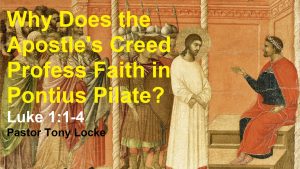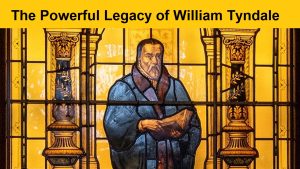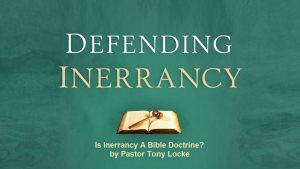About the Bible
Despise NOT Prophesying — 1 Thessalonians 5:20
August 21st, 2016 1 Thessalonians 5:19 Everybody on this planet hears the voice of God speaking to them about His glory. Psalm 19:1-4 The heavens declare the glory of God, and the sky above proclaims his handiwork. 2 Day to day pours out speech, and night to night reveals knowledge. 3 There is no speech, nor…
Read MoreWhy Does the Apostle’s Creed Profess Faith in Pontius Pilate? — Luke 1:1-4
Reverend Anthony R. Locke June 27th, 2010 at the First Presbyterian Church of Tucker Luke 1:1-4 Apostle’s Creed Series 10 English Standard Version 1 Inasmuch as many have undertaken to compile a narrative of the things that have been accomplished among us, 2 just as those who from the beginning were eyewitnesses and ministers of…
Read MoreIs My Bible Reliable?
Reverend Anthony R. Locke March 20th, 2011 www.FirstPresTucker.org at the First Presbyterian Church of Tucker Are English Bible’s the Word of God? Psalm 119:89-96 Do I hold in my hand the Word of God? English Standard Version 89 Forever, O Lord, your word is firmly fixed in the heavens. 90 Your faithfulness endures to all generations; you…
Read MoreDo Rocks and Fossils Take a Long Time to Form?
From grade school to college, we are taught that rocks and fossils take a very long time to form and that they are proof that the earth is hundreds of millions of years old. Part of the process of creating fossils is for the soil, dirt or sand surrounding the object to harden into rock.…
Read MoreThe Powerful Legacy of William Tyndale
by Reverend Anthony R. Locke Psalm 56:1-13 English Standard Version 1 To the choirmaster: according to The Dove on Far-off Terebinths. A Miktam of David, when the Philistines seized him in Gath. Be gracious to me, O God, for man tramples on me; all day long an attacker oppresses me; 2 my enemies trample on me all…
Read MoreIs Inerrancy A Bible Doctrine?
Matthew 5:17-20 17 “Do not think that I have come to abolish the Law or the Prophets; I have not come to abolish them but to fulfill them. 18 For truly, I say to you, until heaven and earth pass away, not an iota, not a dot, will pass from the Law until all is…
Read More



